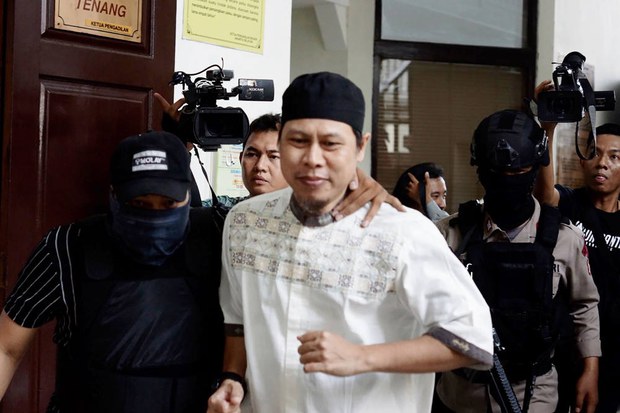Indonesia: Court Begins Hearing on Disbanding Militant Group JAD
2018.07.24
Jakarta
 Jamaah Ansharut Daulah leader Zainal Anshori arrives at South Jakarta District Court, July 24, 2018.
Jamaah Ansharut Daulah leader Zainal Anshori arrives at South Jakarta District Court, July 24, 2018.
A court in the Indonesian capital began a hearing on Tuesday to determine if Islamic State-linked Jamaah Ansharut Daulah (JAD), a group blamed for a series of terrorist attacks in the country in recent years, should be disbanded.
The hearing is the first of its kind in Indonesia, after revisions to an anti-terrorism law allowing such action passed in May.
“Zainal Anshori as the leader of JAD has said JAD is intended to be a place for the supporters of the caliphate to gather and take actions, including jihad,” prosecutor Heri Jerman said.
“The supporters were then motivated to carry out terrorist acts in various parts of Indonesia.”
Those include a Central Jakarta attack that killed eight people, including the four perpetrators on Jan. 14, 2016. The first strike in Southeast Asia claimed by IS was coordinated by Saeful Muthohir (alias Abu Gar), the leader of JAD’s military wing, according to the indictment.
Saeful was sentenced to nine years in prison in November 2016 for his role in the attack.
JAD also is blamed for a suicide bombing at an East Jakarta bus terminal on May 24, 2017, that killed five people and wounded 10 others, and an attack on a church in Samarinda in East Kalimantan province that killed a child.
Jo bin Muhammad Aceng Kurnia (alias Juhanda), the man responsible for the church attack, was sentenced to life in prison.
New laws allow govt action
The U.S. government added JAD to its list of Specially Designated Global Terrorists in January 2017. Indonesia has no such list, and until recently had no legal mechanism in place to ban groups that espouse violent extremist ideology.
“Designated as a terror group or not, Indonesia will always be pursuing terrorists,” Brig. Gen. Hamidin, a senior official at the National Counterterrorism Agency, told BenarNews in January 2017.
A year ago, the government used an executive decree to ban the Indonesian branch of Hizbut Tahrir, an organization calling for Muslims worldwide to unite under an Islamic caliphate.
President Joko “Jokowi” Widodo approved the decree, which made it easier for the government to revoke the legal status of civil society groups seen as fomenting social unrest and threatening Indonesia’s unity. The measure has since become law.
In May, meanwhile, the Indonesian parliament passed revisions to the country’s 2003 anti-terrorism law, allowing police to take preventative measures and formalizing a military role in counterterrorism efforts.
Pressure to revise the law grew following suicide bombings involving whole families and other attacks that killed 14 civilians and seven police that month. The revised law was approved a day after a parliamentary committee ruled that spreading ideology or political views that threaten national security could be defined as terrorist acts.
“Under the law on terrorism, any organization that poses dangers to society can be banned,” prosecutor Heri said.
Witnesses
Zainal, who is serving a seven-year jail term following his conviction in February on a terror conspiracy charge, was one of the JAD members appearing in court. He has been the group’s leader since November 2015.
Among those testifying were Abu Gar, Joko Sugito – the JAD emir for East Kalimantan – and Yadi Supriyadi, who was in charge of the Greater Jakarta area.
Joko Sugito and Abu Gar confirmed they were part of JAD’s leadership and they attended a consolidation meeting organized by the group in Malang in November 2015. But they denied any involvement in terrorism.
“The meeting was intended to unite manhaj [methods] conveyed by Abu Bakar al-Baghdadi,” Abu Gar said, referring to the IS leader.
“I have never promoted JAD in Samarinda. I was the only one” in East Kalimantan, Joko Sugito said.
He denied that Juhanda, who threw a Molotov cocktail at a church in November 2016, killing a 2-year-old, was a member of JAD. He said Juhanda had pledged allegiance to IS.
Abu Gar denied coordinating with alleged IS ideologue and JAD founder Aman Abdurrahman before the Central Jakarta attack. Aman was sentenced to death last month for his role in attacks carried out by JAD militants.
Abu Gar admitted, however, that he spoke with Iwan Darmawan (alias Rois), who is on death row for the 2004 bombing of the Australian embassy.
Yadi told the court that JAD was formed to forge a common perception about the IS caliphate as per al-Baghdadi’s visions.
He said Aman gave a speech through a mobile phone during the JAD gathering in Malang.
“[He] encouraged [JAD members] to commit amaliyah [actions] if they were able,” Yadi said.
The hearing is to resume Thursday.







